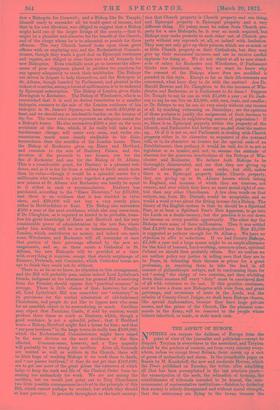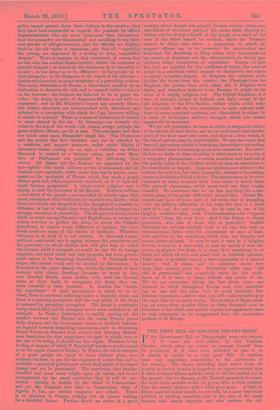THE - ASPECT OF EUROPE.
1VOTHING can surpass the dullness of Europe from the 1.1 point of view of the journalist and politician—except its disquiet. Toryism is everywhere in the ascendant, and Toryism should be the product of content, yet from every country every- where, unless we except Great Britain, there comes up a sort of groan of melancholy and alarm. In the remarkable paper on Russia by M. Koscheloff, the new and moderate Herzen, which the Times published on Tuesday, the writer, after admitting all that has been accomplished in the last nineteen years— the emancipation of the serfs, the relaxation of tyranny, the establishment of tribunals intended to be honest, the com- mencement of representative institutions—finishes by declaring that society is utterly disorganised and without moral strength, that the aristocracy are flying to the towns because the police cannot protect them from violence in the country, that they have been superseded as regards the peasants by official Superintendents who are more tyrannical than themselves, that the peasantry are discontented and unwilling to use their new powers of self-government, that the officials are slipping back to the old i-eigime of repression and that all, "especially, the young, are oppressed by a feeling of deep, unqualified despair." There is rhetoric in that statement, of course, but no one who has studied Russia recently denies the existence of painful disquiet ; of .denbts.in the stateamen as to thesafety of society; in the Army as to its efficiency ; in* the -people as to their prospects ; in the Einperor as the result 'of his reforms,— doubts which are but so many symptoms of a prevailing malaise. The social disturbance hi Russia, a disturbance -marked by an inclination to threaten the rich and to commit 'Violent crime, is on the increase ; the ill:lances are believed to be in grave dis- order ; the Army, in spite of desperate efforts, is not fully re- otganised.; and as Mr. Schuyler's - report has recently shown; the Asiatic provinces are honeycombed with discontent and infested by a corruption with which the Czar, however willing; is unable to contend. .There is a sense of failure and of trouble to come .abroail in the air. In Germany—so recently ele- vated, to the top -Of the world—all classes, except perhaps the great military officers, are ill at ease. The statesmen fear that too much rests upon Bismarck's single life: The Professors and the people fear that Germany may yet be attacked by a coalition, and support Measures 'under which liberty of discussion seems coming to an end, a criticism on Prince Bismarck is ' treated as a heinous crime, and even Mem- bers of Failiainent are punished for delivering their advice. All classes but the Junkers' are oppressed by the iron rigidity with which military serviee is demanded, and all, Junkers more especially, Stiffer under that rise in prices, c,onse quentort the spoliation or Frames, which has made a people always poor feel, -while apparently enriched, as if it had sud- denly become pauperised. A thinly-veiled religious' war is .raging in 'half the provinces of the Empire. Thirteen Millions --one-third of the people—are mortified by attacks upon 'their creed, sanctioned with exultation by another tvio-thirds; while thoife twO-thirds are disquieted by the thoughts of a possible re- tribution, in fear of which they every day demand stronger and stronger measures of prevention. The disquiet, it is true, Shows itself,' as Usual" among Germans and Englishmen, in intense ex- ertion, exertion to perfect the Army, tO coerce the Catholic priesthood, to repress 'every difference of opinion; but over- strain produces many of the results of lassitude. Whatever Germany is, at least it is not content. In Denmark a semi- political, semi-social Waris raging between the proprietors and the peasantry, iii whiCh' neither side will give way,' in "which the dynasty itself is menaced, or would be but for its foreign supports, and amid which not only progress, but even govern- ment seems to be becoming impossible. If Denmark were larger, the contest could' only be decided by Revolution. In Scandinavia the upper classes, who watch the situation' of their country with alarm, dreading Germany as much as they ever dreaded Russia, seem unable, even with the Govern- ment at their back, to reorganise the Army they con- Sider essential to their freedom. In Austria the doubt- ful experiment" of dual government is about to be re- vised, there is universal suffering under a financial crisis, and there is a growing perception that the very safety of the State is menaced by Pecuniary corruption. The Ariny is constantly being remodelled, yet its managers never seem confident in its 'Strength. In Turkey bankruptcy is rapidly coining on, the conflict between the Empire and the vassal Princes grows daily sharper, and the Government seems to vacillate between an impulse towards despairing concessions, such as dismissing Grand Viziers on demand from abroad, and releasing Mussul- man fanaticism for that sanguinary struggle in which, true to the law of its being, it should one day expire. Nowhere is the feeling of despair of which M. should, speaks so predominant as in the upper classes of Turkey. In France the whole energies of a great people are taxed to bear, without glory, new military burdens, to pay for the expenses of a lost war, and to establish a system of government which shall admit of ' incessant change and yet be permanent. The conviction that another dreadful war must come weighs upon all minds, and is not accompanied by the usual conviction that it will be suc- cessful. Society is shaken by the dread of Communism, and yet the Utopians who lend to Communism what of dignity it has, are neither sanguine nor ardent. There N3 no gladness in France nothing but an uneasy waiting for a doubtful future. Further South we arrive at a great country where despair has actually become a force, where over two-thirds of its extent political life seems dead, where a re- bellion not involving a fourth of the people or a, tenth of the area of the State cannot be crushed, where the Treasury cannot be filled, and where a transaction by which in- surgent officers are to be rewarded for insurrection and honoured for deserting a King whom they themselves set up cannot, so desperate are the circumstances, be finally pro- nounced either treacherous or unpatriotic. Europe for ages has had no parallel for the condition of Spain, has seen no people in a condition which seemed to themselves and others so nearly to justify despair. In Belgium the religious strife divides the towns from the country, the Flemings from the Belgians, the patties from each other, till, if Belgium were Spain, and therefore isolated from Europe, it might be the scene of a raging religious war. The United Kingdom, it is true' is tranquil, except in Ireland, and Italy except in the old kingdom of the Two Sicilies, within which social order does not exist; but the two exceptions in each case are suffi- dent to cause perpetual anxieties, not diminished in either by a sense of inadequate military strength, which yet cannot apparently be increased.
We are not pessimists, we have no desire to deepen the colour of the sketch we have drawn, and we are well aware that the dis- quiet of the hour must pass away, and that in a time which, in the life of nations, may be imperceptible. We are also aware that beneath the surface wealth is increasing, knowledge is advancing, and civilised mania bec,oming much more numerous. But never- theless we desire to draw attention to what seems to us a new, if a temporary phenomenon,—a certain weariness and lassitude in the public mind of the civilised world, so deep as sometimes to be describable as despair. Immense problems are offered to the nations for solution, hilt their immensity, instead of increasing, seems to diminish political activity. The nations seem to be over- whelmed by them, to stand aloof from them,' o watch them like natural phenomena, whieh must work out their resulte unaided. No statesman that we see has anything like a con- scious grasp of the great difficulties around him. Prince Bis- marck may have of 1301310 part of his work, that of grappling with the military difficulties of his task, but that is a small part of it, and the rest escapes. As he says, in one of his mighty conflicts—that with Ultramontanism—he "expects no result" from his own laws. And if the Prince is almost powerless, who else is there who is powerful I Outside Germany the nations certainly look to no one, but wait on circumstances, listen with the expectation at once of lassi- tude and fear for the something which does not happen, but seems always at hand. It may be war, it may be a religious revival, it may be a new creed, it may be merely a new dis- covery in physics, but there is a sense that something is at hand, for which all who wait must wait in irritable patience. That sense is probably unreal, a mere exptession of a general anxiety ; but it exists, and its existence shows how deep that anxiety must be. Everybody alike says, "All this is provisional," and everybody waits for the settle- ment as if it were to come without any action of his. We do not remember during the last thirty years any moment in which throughout Europe men were manifest- ing at one and the same time so much lassitude, list- lessness, expectancy—call it what you will—and submitting at the same time to so much strain. The position of Spain, send- ing up every three months thirty or forty thousand men to terminate a war which she neither expects nor apparently cares to end, represents in an exaggerated form the momentary position of all Europe.



































 Previous page
Previous page